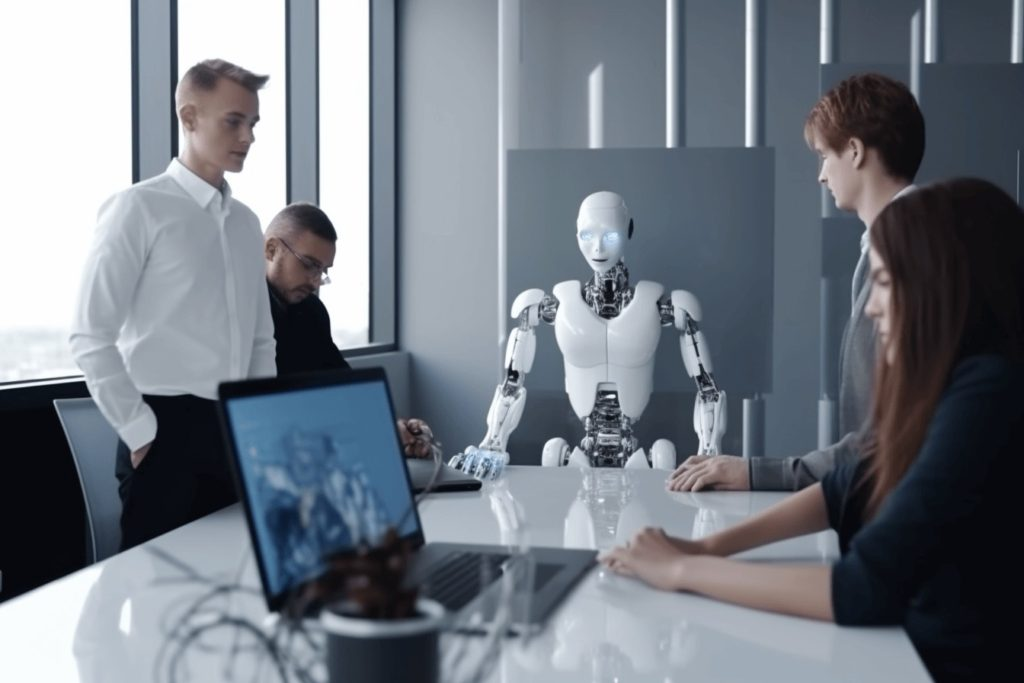Human + Machine: The Winning Formula in a Communications Agency
In a world where technology advances at a dizzying speed, and where messages multiply by millions every second, communication requires more than intuition and experience: it requires augmented intelligence. And that’s where the formula that is redefining work in any modern communications agency comes in: Human + Machine = Optimal Result.
Artificial intelligence (AI) is not here to replace any professional in any field, nor to take control of the narrative. Its role is different: to enhance what humans do best, freeing them from the most tedious tasks and allowing them to focus on what is truly strategic. And when this balance is achieved, campaigns not only become more effective, but also more human, more relatable, and much more relevant.
The real value of AI in a communications agency
AI is fast, tireless, and precise. It can analyze thousands of data points in seconds, draft texts, monitor media in real time, and generate automatic reports. But there’s one thing it can’t do on its own: interpret cultural codes, read social tone, and understand the emotionality that defines each market.
This is where the true power of hybrid work comes into play. In a communications agency, combining algorithms with human sensitivity is the smartest way to operate. Because, even if a machine can write a “correct” headline, only an experienced professional knows whether that headline resonates with a specific audience or, on the contrary, could generate rejection.
Brands that manage to combine these two worlds have a clear advantage. Not only because they will be able to respond more quickly to changes in the environment, but because they will be able to do so with a level of depth that makes them truly relevant.
At MarketCross, for example, this hybrid model is already in full swing. AI handles tasks such as:
1. 24/7 media monitoring: Detecting mentions, classifying sentiment, and grouping coverage.
2. Initial content writing: Draft press releases, social media posts, interview transcripts, or executive summaries.
3. Trend analysis: Identifying patterns, emerging themes, and potential reputational risks.
4. Data aggregation for reporting: Automating dashboards, charts, and key KPIs.
All of this frees up teams so they can dedicate more energy to interpersonal relationships, market-tailored storytelling, and message refinement. It’s not just about being efficient, but also about being relevant in every process.

You may be interested: Are you evolving as fast as AI? Keys to standing out with a great communications agency
LATAM, where AI needs a human translator
When we talk about Latin America, we’re talking about a universe of unparalleled emotional, historical, and cultural diversity. What works in Bogotá may sound cold in Lima, and a phrase accepted in Mexico may be offensive in Buenos Aires. Therefore, any communications agency in Latin America knows that it’s not enough to translate literally or apply a global copy-paste strategy.
AI can suggest content based on data, but only a local editor can interpret how it will be read in a specific context. This is one of the greatest contributions of the human factor: the contextual and emotional reading that no machine can provide alone.
And it’s not just about language, but also about rhythms, idioms, prevailing values, and particular sensibilities. In LATAM, each country is a distinct ecosystem, with its own heroes, taboos, priorities, and wounds. Any effective communication must start from that foundation.
Humans and machines: an alliance with well-defined roles
When tasks are distributed well, the team is strengthened. The machine does what it knows best: processing, organizing, predicting. The human contributes what no AI can simulate: intuition, empathy, a sense of humor, the ability to read between the lines.
This alliance is revolutionizing work in agencies. It’s no longer a matter of choosing one or the other, but rather using them together to achieve a much better result. For example:
● AI proposes headlines and the human team adapts them according to the local tone.
● AI detects trends and strategists decide which ones have the potential to become campaigns.
● AI generates drafts and communicators refine them with brand voice, sensitivity, and style.
In this model, human talent isn’t reduced: it’s multiplied.
What’s at stake: relevance, agility and depth
Brands that manage to combine these two worlds have a clear advantage. Not only because they will be able to respond more quickly to changes in the environment, but because they will be able to do so with a level of depth that makes them truly relevant.
In the world of public relations, where emotional and reputational issues constantly intersect, relying on AI is not enough. Human guidance is needed. But doing everything by hand is not viable either. Efficiency is needed. Therefore, the future is neither robotic nor nostalgic. It is collaborative.
Furthermore, speed without depth can be counterproductive. It’s not enough to respond first; you have to respond well. And that can only be achieved with a strategic approach that interprets the context, the client’s story, and the social mood. Artificial Intelligence can warn of a potential crisis, but deciding how and when to intervene remains the task of human experts who understand the cultural codes of the territory.
On the other hand, this human-machine collaboration opens the door to a new dimension of innovation in communications. Agencies that integrate AI not only improve their efficiency, they are also better positioned to experiment with formats, metrics, and personalized narratives that were previously unthinkable due to operational limitations. The result: more creative, more human, and, at the same time, more precise campaigns.
You may be interested: MarketCross and NVIDIA win silver at Eikon International Awards with IA press tour
Frequently Asked Questions (FAQs)
Can AI completely replace a communications agency’s teams? No. AI can automate specific tasks, but it doesn’t replace human skills such as creativity, strategic judgment, and cultural understanding.
What are the concrete benefits of integrating Artificial Intelligence into a communications agency in Latin America? Increased speed in content production, constant environmental monitoring, real-time insights, and improved data-driven decision-making.
Is training required to work with AI? Yes, although many tools are intuitive. Curiosity and practice are also good teachers. Can Artificial Intelligence understand the emotional context of a crisis? Not completely. It can detect early signs or changes in sentiment, but crisis interpretation and empathetic management remain human tasks.

It’s not about “one” or “the other”, but about “both”
Digital transformation is already redefining what it means to be a modern communications agency. And in this new era, there’s no need to choose between machines or people: we must build bridges between the two. Agencies that understand this will not only be more efficient, they will also be more human, more relevant, and more resilient.
At MarketCross, we’re committed to this hybrid future: where AI does the hard, repetitive work, and people do what no one else can do—creating connections, interpreting emotions, and telling stories that matter. If you’re looking for a communications agency that combines the best of technology with the best of human talent, we’re here. And we’re ready to help you communicate better, faster, and with greater impact.
About MarketCross
We are a global public relations agency that since 1996 has been helping to create connections between great brands and their audiences in an innovative and personal way, enhancing their reputation and narrative to drive business outcomes.
Our track record of co-constructing with more than 300 clients from diverse cultural backgrounds and industries has given us a unique perspective for delivering customized and effective strategic communications solutions to anywhere in the world.
Our team of experts, located in major cities around the world, combines a global outlook with in-depth local market experience and a sense of curiosity that transcends borders and ensures that they stay abreast of the changes and trends occurring in different markets and societies.
MarketCross has received several different international awards including the Latin America Excellence Awards (2016 and 2018), Eikon Chile (2022), Eikon Argentina (2023), Eikon Internacional (2023 and 2024).



